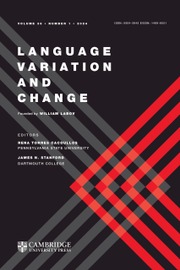Article contents
Accountability in morphological borrowing: Analyzing a linguistic subsystem as a sociolinguistic variable
Published online by Cambridge University Press: 12 August 2008
Abstract
Principles of structural borrowing have been proposed, relating to structures of the languages involved and sociodemographic circumstances of their respective societies. This article quantitatively evaluates the roles of both linguistic and social factors in structural borrowing via examination of language contact data from Aruba and Curaçao, where creole Papiamentu is in contact with Spanish, Dutch, and English. Variationist methods, rooted in Labov's Principle of Accountability, are applied in a novel way to the system of verbal morphology to flesh out factors promoting borrowing. Linguistic factors are found to be quantitatively stronger, and only one nonlinguistic factor was found to promote borrowing. Results are discussed in light of prevailing theories of language contact. Findings contribute to our understanding of the long-term consequences of language contact and the relationship of contact-induced change to a more general sociolinguistic theory of language variation and change.
- Type
- Research Article
- Information
- Copyright
- Copyright © Cambridge University Press 2008
References
REFERENCES
- 4
- Cited by


